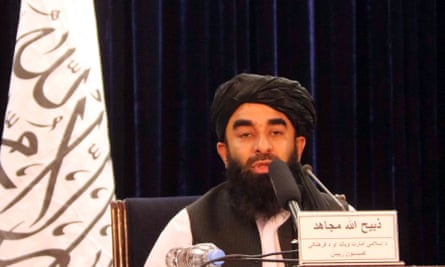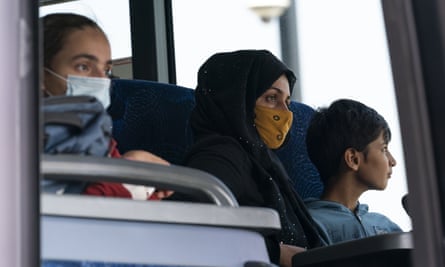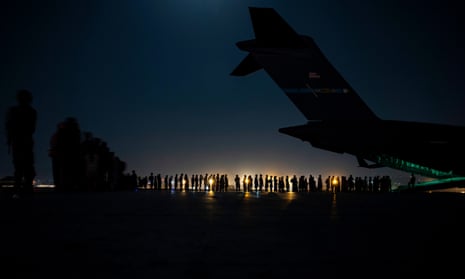The Taliban have moved to prevent Afghans from leaving the country by joining the US-led airlift, declaring the route to Kabul airport only open to foreigners.
The Taliban spokesperson Zabihullah Mujahid said: “The road that ends at Kabul airport has been blocked. Foreigners can go through it but Afghans are not allowed to take the road.”
The decision is likely to leave tens of thousands of Afghans who had been hoping to escape trapped under Taliban control.
A number of cases had emerged in recent days of Afghans heading to the airport being turned back at Taliban checkpoints, including those with approval from western countries to join the air bridge as the group seeks to tighten its grip on the airport and the capital.
Mujahid offered contradictory justifications for the policy. He said on the one hand that the Taliban had stopped Afghans from going to the airport for fear that people might be killed in a stampede, but on the other that the evacuation was taking out experts such as engineers and doctors.
“We ask [the Americans] to stop this process,” he said. “This country needs their expertise. They should not be taken to other countries.”

Mujahid repeated the Taliban’s earlier announcement that they would not allow the US to extend next week’s deadline for a complete withdrawal.
“They have planes, they have the airport, they should get their citizens and contractors out of here,” he said.
His comments came despite a visit to Kabul by the CIA director, William Burns, who reportedly met the Taliban leader in secret on Monday in the highest-level diplomatic encounter since the group took over.
Burns met Abdul Ghani Baradar, according to unnamed US officials, as the Biden administration continued efforts to evacuate US citizens and other allies.
The CIA declined to comment on the meeting, but the report speculated that a likely subject of discussion was the impending 31 August deadline for the US military to conclude its airlift.

The meeting took place as the UN’s top human rights official described credible reports of serious human rights violations committed by the Taliban in Afghanistan, including summary executions of civilians, restrictions on women and limitations on protests against their rule.
At an emergency session of the UN human rights council, called at the request of Pakistan and the Organisation of Islamic Cooperation, its head, Michelle Bachelet, called for a mechanism to monitor Taliban actions, describing the Taliban’s treatment of women and girls as a “fundamental red line” and warning that “significant numbers of people will seek refuge in neighbouring countries or outside the region”.
Describing the air bridge from Afghanistan, one Nato country diplomat said western nations were working at a “war-footing pace” on Tuesday to get people out of the country.
The US military on Tuesday said it had evacuated the largest number of people from Afghanistan since the operation began.
About 21,600 people were flown safely out of Taliban-held Afghanistan in the 24-hour period that ended early on Tuesday, the White House said. That compares with about 16,000 the previous day.
Biden has suggested between 50,000-65,000 Afghan allies could be eligible for evacuation. To date the US has evacuated 37,000 people since 14 August but it is not clear how many of those are foreigners and how many Afghans.

Those numbers appear to represent only a small portion of the people who want to leave.
Widespread chaos punctuated by sporadic violence has gripped Kabul’s airport, with western troops and Afghan security guards driving back crowds desperate to flee after the Taliban’s take over of the capital on 15 August.
Biden has warned that the evacuation was going to be “hard and painful” and much could still go wrong. A number of countries including Spain and the UK have issued sombre warnings that not all Afghans who worked for foreign missions would be evacuated.
The Taliban have described the presence of foreign troops beyond the end of August as a “red line” that would have “consequences”, diminishing hopes of an extension to the airlift effort.
While the UK defence secretary, Ben Wallace, said efforts to win an extension would continue, he was doubtful it would happen.
Despite international calls for an inclusive political settlement in Afghanistan, the Taliban on Tuesday continued to consolidate its power, appointing a new finance minister, an intelligence chief, and an acting interior minister.
According to the Pajhwok news agency, Gul Agha would be the finance minister and Sadr Ibrahim would be the acting interior minister. Najibullah would be the intelligence chief, while Mullah Shirin would be Kabul governor and Hamdullah Nomani the mayor of the capital.
Many Afghans fear a repeat of the brutal interpretation of sharia law that the Taliban implemented when first in power from 1996-2001, or retribution for those who worked with the US-backed government over the past two decades.
On Tuesday, the Taliban insisted once again that – despite Bachelet’s claims – the hardline Islamist movement had no blacklist of opponents targeted for reprisals.
Announcing that it was safe for those crowding the Kabul airport entrances to return home, a spokesperson added that they wanted foreign embassies to remain in the country and had guaranteed their safety.
